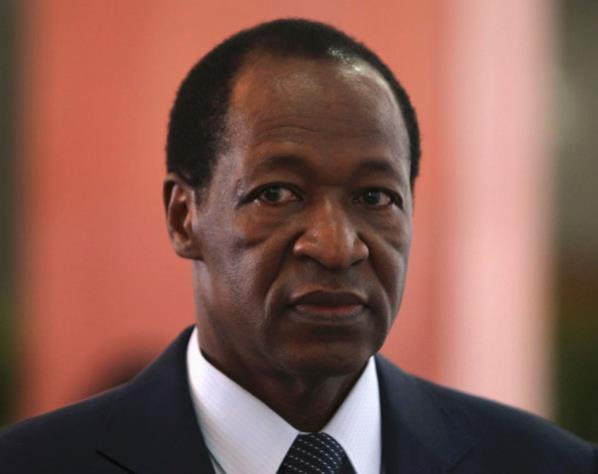Blaise Compaore (Burkina Faso)
Blaise Compaore came to power in 1987; following a coup which saw former president and close Compaore ally Thomas Sankara murdered. Compaore has described the murder as an accident, but the true events remain a mystery due to a lack of investigation. He overturned many of his predecessor’s policies, and went on to win elections in 1998, 2005 and 2010. Under his rule Burkina Faso has been accused of violence against journalists and members of civil society. Compaore is said to be in the process of redrafting the constitution in order to remain in power beyond the end of his term in 2015.
Francois Bozize (Central African Republic)
Francois Bozize Yangouvonda came to power as the President of the Central African Republic after he led a successful coup against former president Ange-Felix Patasse. He seized power, redrafted the constitution and held elections which, after a runoff, he won. Bozize was re-elected in 2011. A 2009 report claims that the human rights record in CAR under his rule has been poor and freedom of speech is limited.
Idriss Deby (Chad)
General Idris Deby came to power in 1990, when he led the rebellion against Chad's former President Hissene Habre. He has overcome several attempts to overthrow his rule. Under his presidency Chad, an oil rich nation that has high levels of poverty among the citizenry, has become the most corrupt nation in the world. He won two presidential elections, before holding a referendum in 2005 which binned the former two-term constitutional limit. He was re-elected in 2006.
Yahya Jammeh (Gambia)
When only 29-years-old, Yahya Jammeh led a group of officers in a peaceful coup to overthrow Dawda Jawara to become the leader of The Gambia. He then founded the Alliance for Patriotic Reorientation and Construction and successfully ran for the presidency in controversial 1996 elections. He was re-elected in 2001, 2006 and again in 2011. Jammeh has been a controversial figure since taking power - with a poor human rights record, hard-line views on homosexuality and religion and the re-introduction of the death penalty in The Gambia.
Denis Sassou Nguesso (Congo)
Congolese president Denis Sassou Nguesso was president of Congo from 1979 to 1992. He returned to power after a five year absence following a civil war in which his supporters overthrew President Pascal Lissouba. He won two subsequent elections (2002 and 2009) in a controversial manner. Sassou Nguesso's presidency has been marred by recurring reports of corruption, which he has tried and failed to suppress. The funds for the president and his circle's extravagant lifestyle have been traced back to the country's oil industry.
Mohamed Ould Abdel Aziz (Mauritania)
The leader of two successful coups, Mohamed Ould Abdel Aziz, transitioned from President of the High Council of State (an office created after the 2008 coup) to become the elected president of Mauritania the following year. Aziz, in his role as Brigadier General of the Mauritanian army, was the leader of the coups that saw Presidents Maaouya Ould Sid'Ahmed Taya and Sidi Ould Cheikh Abdallahi deposed. Earlier this month Aziz was shot in what appears to be (although this is unconfirmed) an assassination attempt.
Omar al-Bashir (Sudan)
Omar Hassan Ahmad Al-Bashir came to power in 1989, when he led a peaceful military coup against of Prime Minister Sadiq al-Mahdi's government. He has been accused of overseeing crimes against humanity and genocide in Darfur, but there was insufficient evidence against him to prove the charges in the International Criminal Court. Before the split from South Sudan, Al-Bashir oversaw a period of economic growth and stability in Sudan thanks to oil profits.
Andry Rajoelina (Madagascar)
President of the High Transitional Authority of Madagascar, Andry Rajoelina, came to power in 2009 when he led the opposition in the ousting of President Marc Ravalomanana. 135 people were killed in the unrest around the coup. Rajoelina has been condemned by the international community for the nature of his rise to power and Madagascar was isolated in the months following the coup. Despite a failure to meet the terms laid out by the international community following the coup - Rajoelina has begun to experience greater acceptance in international diplomatic circles. He has pushed through a new constitution which makes him eligible to run in the presidential election scheduled for March 2013.
Teodoro Obiang Nguema Mbasogo (Equatorial Guinea)
Africa's longest serving leader, Teodoro Obiang Nguema Mbasogo came to power via a military coup against his uncle in 1979. In the intervening 33 years, Obiang has overseen the country's rise as a major oil producing nation. Under his rule, the citizens have remained impoverished and downtrodden, while the dictator and his son (who is his likely successor) have used oil profits to fund extravagant lifestyles. A lack of free press and a repressive political climate means there is little chance for the democratic process to take place. In 2004 there was an unsuccessful coup attempt against Obiang financed by primarily British businessmen, including Mark Thatcher.
Yoweri Museveni (Uganda)

Dictator Idi Amin was removed from power in 1979; however, it was only in 1986 that Museveni took power, following the Uganda-Tanzania war and resulting turmoil. He was sworn in just six months after troops loyal to him took the capital Kampala. Museveni's term in office (26 years and counting) has seen him usher in a period of economic and social stability to the country. He has also been roundly praised for his country's response to HIV/AIDS. However, his decision to invade and occupy Congo, during the Second Congo War and an increasingly repressive political climate in Uganda - have been causes for concern.










Comments
my time here at web, but I know I am getting familiarity all the
time by reading thes good articles.
My page ... secret millionaire method review